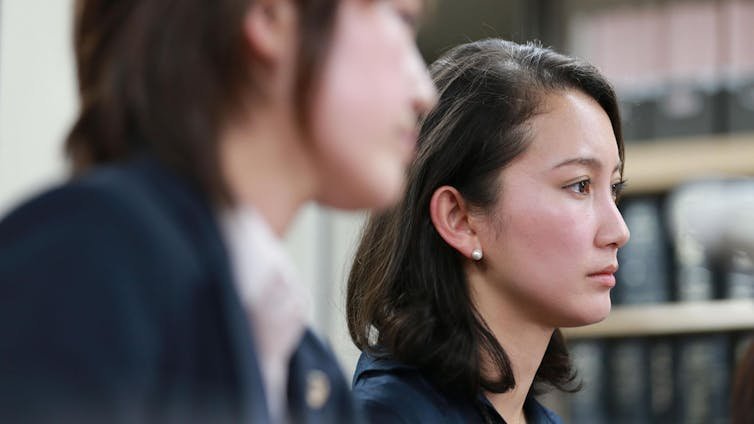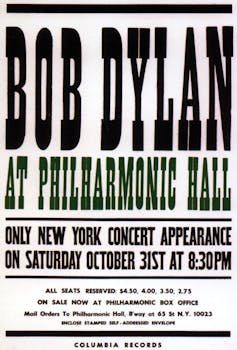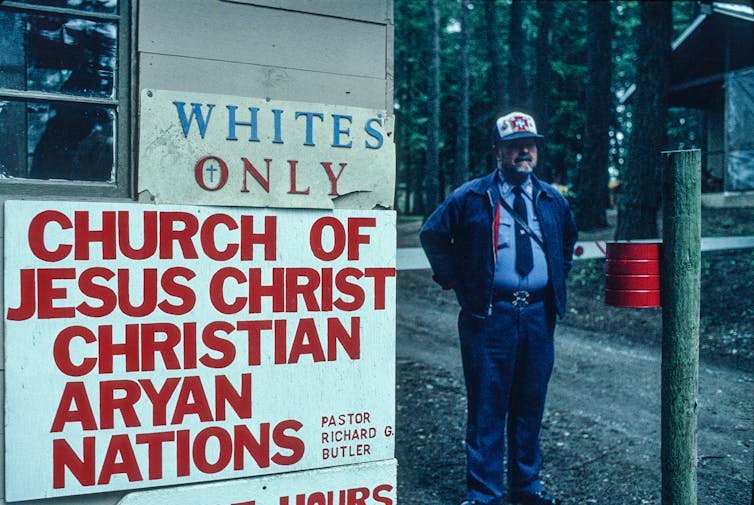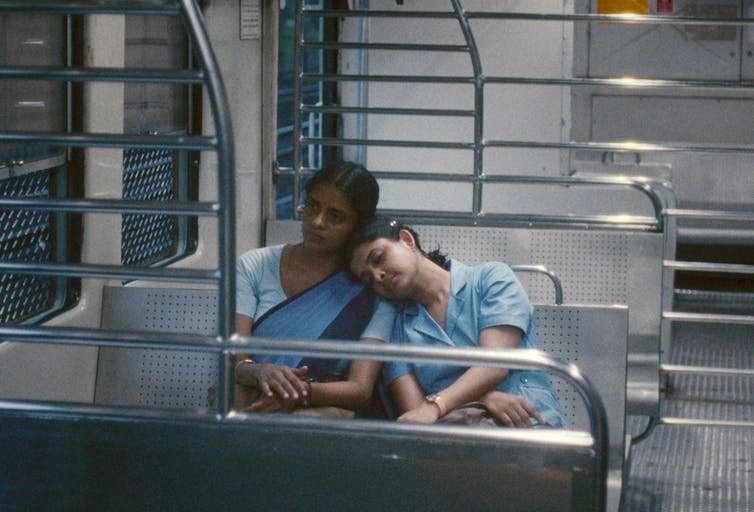Ever since I came to Melbourne as an international PhD student in film studies, the Melbourne International Film Festival (MIFF) has provided me with a sense of home among a community of like-minded cinephiles. To quote Agnès Varda, “Cinema is my home. I think I’ve always lived in it.”
For this reason, I’m honoured to share my top five films from this year’s MIFF. My choices inevitably reflect my viewing preferences, centred around my love for offbeat humour, dark dramas and psychologically complex female leads.
That said, here are the five films that were most memorable and impactful for me.
1. Sweet Dreams (2023)
Bosnian-Dutch writer and director Ena Sendijarević’s second feature offers a more confident take on some of the issues explored in her highly stylised debut, Take Me Somewhere Nice (2019), such as female subjectivity and sexuality amid painful historical subjugation.
Sweet Dreams, set in the Dutch East Indies in the early 20th century, overtly addresses the absurdities of a dark political past. The film revisits the Dutch colonialist project of exploiting Indonesian people under the guise of bringing “civilisation”, by laying bare the colonisers’ irrationality, prejudice and infantilism.
Told through vignettes resembling the chapters of a Victorian novel, the film positions the domestic and sexual exploitation of Siti (Hayati Azis) at the hands of her Dutch master (whose sudden death instigates the plot) as a central point of indignation.
It also explores Siti’s desire for emancipation, and the amorous connection she finds in the rebellious Reza (Muhammad Khan). Siti’s last reluctant dance punctures the coloniser’s perverse attempt to possess and control her.
The film’s visual language references the works of impressionist painter Henri Rousseau, as well as the Dutch art masters Vermeer and Van Eyck. We see this vividly in the lush greenery of the exterior, the gaudy interior of the master’s house, and the uncanny doll-like Dutch colonisers, whose almost porcelain visages are reminiscent of the iconic Arnolfini portrait.
The film’s tableaux are brought to life with an infectiously off-kilter soundtrack, inviting the viewer to contemplate and (self-)reflect. Topped off by masterful acting – highlighted by Lisa Zweerman’s portrayal of the pregnant and mosquito-plagued Josefien – Sweet Dreams fully immerses the viewer in a world that is as absurd as it is tragic.
2. Black Box Diaries (2024)
Shiori Ito is a Japanese freelance journalist and filmmaker whose 2017 memoir Black Box sparked what many have described as “Japan’s #MeToo movement”. The heart-wrenching documentary offers a deeply personal insight into her experience of being sexually assaulted by the older and much more famous journalist Noriyuki Yamaguchi, as well as her refusal to remain silent in the aftermath.

IMDB
Yamaguchi’s connections with then prime minister Shinzo Abe made Ito’s quest for justice additionally difficult in the already conservative atmosphere of Japan, where sexual violence is a profoundly taboo issue.
Ito’s attempt to bring Yamaguchi to the criminal justice system was unsuccessful since, at the time, Japan’s sexual assault laws were more than 100 years old and defined in relation to the use of force. These archaic laws, combined with political corruption and the police’s reluctance to assist victims, meant there was no real prospect of adequate legal redress.
Against these overwhelming odds, Ito shows tremendous bravery and persistence in seeking justice as a journalist investigating her own experience. She portrays her tumultuous journey with emotional rawness and honesty as she turns to the camera, to us as the viewers, to reveal the enduring layers of trauma that come in response to sexual violence.
The film ends with a sense of hope as Ito wins her civil case against Yamaguchi and Japan amends its outdated rape laws by increasing the age of consent from 13 to 16. These are small yet significant steps, as Ito indicated in the Q&A that followed the film’s premiere screening in Australia.
3. The House is Black (1962)
This poetic documentary by celebrated Iranian poet and filmmaker Forough Farrokhzad was screened as part of an Iranian New Wave retrospective.
The film, set in a leper colony outside Tabriz, offers a compassionate and lyrical portrait of its disabled and disenfranchised inhabitants. With the focus on bodies distorted by leprosy, paired with Farrokhzad’s sorrowful voiceover reading verses from the Quran, Bible and her own poetry, it considers the existence of beauty in “supreme ugliness, a vision of pain no human should ignore”, as announced in the opening.
Despite the overwhelming sense of melancholy permeating the film, there is joy and pleasure to be found. We see this in montage sequences of birds flying, a young girl brushing her long raven hair, children playing and the outcasts’ timid smiles.
The film’s liminal dwelling between movement and stasis, light and darkness, pessimism and joy is at the forefront of the poeticism of New Iranian Cinema that engenders politically subversive ways of seeing.
4. On Becoming a Guinea Fowl (2024)
Zambian-Welsh filmmaker Rungano Nyoni’s On Becoming a Guinea Fowl is a harrowing experimental film. The fictional story is interspersed with excerpts from a children’s TV show about local animals – including guinea fowls – that hint at unspoken memories which haunt the main narrative.
The film opens on a dark road in the desolate Zambian landscape. Stony-faced Shula (Susan Chardy) is dressed almost comically as a guinea fowl as she drives home from a costume party in her expensive car. We see no emotion on her face as she slows down to find her uncle Fred lying dead by the roadside.
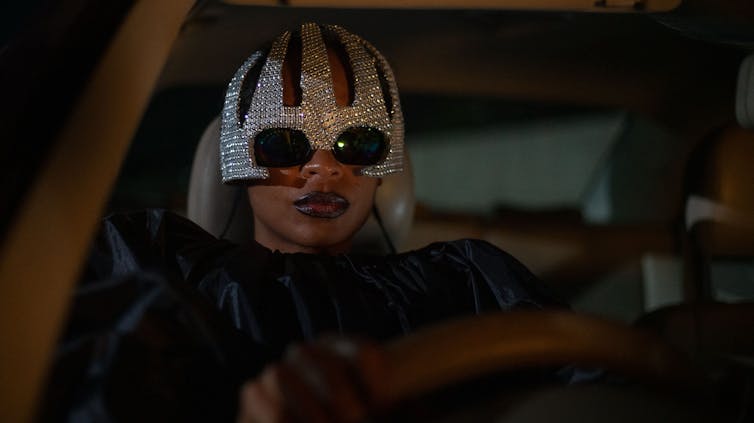
IMDB
There is a brief schism in time where we see Shula as a little girl with the same blank expression. This hints at the disturbing experiences Shula and her female cousins had while growing up around Fred – which become clearer as the film unfolds.
Fred’s predatory nature is in plain sight but unspoken, obscured by familial secrets. It appears only in the cracks of the family’s customary expression of grief. The female elders, despite knowing what Fred did, participate in blaming Fred’s underage widow for her dead husband’s despicable deeds.
As the funeral proceedings progress, the female elders offer Shula and her cousins support through communal song and crying in secret women’s spaces removed from the public. But we are never offered a sense of justice or hope for liberation.
In the final scene, Shula and her cousins arrive at a familial dispute over Fred’s estate, screeching like guinea fowls. This harks back to the TV show’s depiction of the guinea fowl, symbolically announcing the presence of a predator, before darkness engulfs the screen, leaving us pondering.
5. Thelma (2023)
Most of the films I’ve chosen explore the violence, control and double standards women are subjected to. Thelma explores a different kind of oppression: the way society treats its elders.
Its titular protagonist, Thelma Post (June Squibb), is a woman in her 90s who lives independently despite her family’s concerns. We’re initially invited to think of Thelma as a grandmother, mother, widow and frail older woman, but it soon becomes clear her agency extends far beyond her relationships. After losing $10,000 to an elaborate scam, Thelma decides to fight back and track down the scammers.
She teams up with her old acquaintance Ben (played by the late Richard Roundtree) to embark on a risky but fun-filled journey across Los Angeles on a tandem mobility scooter. As Thelma and Ben hunt down the scammers, they also have to shake off Thelma’s family, who are desperately trying to track her down.
The film’s core relationship is that of Thelma and her grandson Danny (Fred Hechinger), a sweet but aimless 24-year-old who can’t find a job, is losing his girlfriend, and feels paralysed by the crushing weight of his parents’ expectations.
The parallels between them are uncanny: Danny’s parents view both of them as hopeless, burdensome and a source of worry, rather than people who have agency and can take care of themselves. Danny and Thelma defy these expectations throughout the film, challenging stereotypes about youth and the elderly.
For all its thematic depth, Thelma is primarily a comedy. This was evidenced by the raucous laughter and applause from a packed Forum theatre. The film serves up a hilarious parody of common action movie tropes, including high-speed scooter chases and a no-look, walk-away moment as an oxygen tank explodes in the background.
If you’ve ever wondered what an action sequence performed by a 93-year-old actress looks like, Squibb’s performance is not one to miss.






